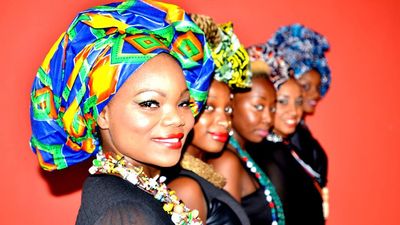The Fashion Movement Bridging Culture & Couture in Maputo
Wumburi is a symbol of cultural and feminine pride in Mozambique. Get to know the movement.
Three young Mozambican women are bridging culture and couture in the streets and catwalks of Maputo.
In January 2013, Eduarda Guitunga, Witnei Liaand Melba Jorge returned from their lives in South Africa to start their Mozambican-registered cultural brand. Making use of capulanas (traditional Mozambican cloth), the friends set out to integrate Mozambican culture and pride into everyday fashion. Nowadays women and men alike can be seen sporting Wumburi's turban's just about everywhere.
As an immigrant in South Africa, I was initially hesitant to wear a Wumburi headwrap. It seemed like a bold move, even as someone who takes pride in her culture. But what started as an alternative to battling the cold weather and keeping my unruly hair at bay quickly turned into a symbol of deep cultural pride for me.
Mozambicans are constantly confronted by the fact that our cultures are inherently different. We have a tendency to celebrate our traditions in fragments and restrict our practices to geographical locations. It’s difficult to speak of a “Mozambican culture” under one banner. The introduction of Wumburi marked a revival of our history. For many of us, the wrapping of capulana on one's head became an icon of unification and pride.
I caught up with Maputo-based writer and poet Eliana Nzualo, one of Wumburi’s active ambassadors, to find out more about the movement.
The following interview has been edited and condensed.


Celma Costa for Okayafrica: Tell us about the origin of the Wumburi project...
Wumburi literally means “natural beauty.” We wanted with this movement to take us back to a time and place when we were naturally ourselves and we recognised our own beauty through our standards. Our goal is to promote and empower African culture and in that we try to always bring some form of educational aspect to our campaigns.
How does the project elevate Mozambican culture?
It’s a movement founded in Mozambique, by Mozambicans for Mozambicans. More so, it focuses primarily on the younger generation that sometimes loses sight of their identity when trying to fit into our ever-changing society.
And how are you capturing Mozambican culture differently than what’s been done before?
There are different aspects to any culture. It is not in our place to say, "This is Mozambican culture," or to decide what does or doesn't apply to our traditions. What we try to do is build a bridge between the generations so that these conversations can take place. We use turbans as a way to do that: to challenge everyone to wear a crown and own it proudly. We do video tutorials to teach people to do it. We do workshops. We talk with different groups. We try to learn from our grandfathers, our mothers, our neighbours, and from that we capture different elements. That is our work as Wumburi.
Wumburi includes the covering of a woman's head. Considering the cultural diversity of Mozambique, do you believe Wumburi speaks to all Mozambican women, despite their specific cultural practices?
Different women will feel comfortable with different things. It was never our intention to represent a specific group. Wumburi represents the many ways women and men own their beauty naturally. How they represent the past, present and future of our culture. We have women in the movement that don't wear turbans, but identify with the values and stories that we bring to the public.
Are you happy with the way Wumburi has been incorporated in contemporary Mozambican fashion?
Yes, very much so. Since we started, there have always been a lot of people ready to join the movement. From everyday people to artists and fashion designers, they’ve all contributed to our success in some way. They allowed us to be on their platforms and showcase our work.
On a larger scale, it’s also a good moment for African fashion in general. We see traditional elements everywhere, from the beads, to the fabrics, the aesthetics. We as Mozambicans are all a part of that.
Besides being a fashion statement, what is the social function of Wumburi?
Our goal is to promote and empower African culture and more specifically our context––Mozambique. We try to educate people on local traditions and terms to recover some elements that people don't always understand.
What do you make of the fact that so many men have joined the movement?
We love it! Wumburi is not just for women, although they are our main target. We always wanted men to feel comfortable and welcomed in our movement.
Do you think there’s a balance between culture and couture, or that the one always overtakes the other?
They can be complementary. Fashion is not supposed to be something unattainable. It should be a way of expressing yourself, an extension of your identity and preferences. That is why we believe that culture and couture can't compete. One needs to always be with the other.
Celma Costa is a lover of all things bright and yellow, with an unorthodox taste for neuroscience and politics. Keep up with her at her blog, The Nomad Settler.
